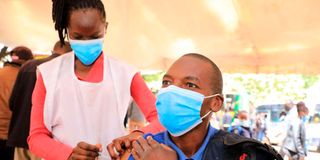The A to Z of Covid booster shots

Nurse Faith Chepngetich administers the Moderna vaccine to Raphael Shem at Kencom bus station on December 23. Those who are fully vaccinated can now get booster shots.
As the Omicron surge drives Covid-19 infections to record highs globally, putting health systems under immense strain, governments are now hurrying to have their population protected against the virus by offering a booster shot.
Studies have shown that an initial course of Covid-19 vaccines—typically given in two doses—may not be enough to halt infection from Omicron, but a booster shot may help.
Booster shots have been found to offer a higher level of protection against the new variant, with countries such as Israel already offering a fourth dose.
Data from clinical trials showed that a booster shot increased the immune response in trial participants who finished a Pfizer-BioNTech or Moderna primary series six months earlier or who received a J&J/Janssen single-dose vaccine two months earlier.
Kenya has released new guidelines on booster shots and becomes the fifth country in Africa to offer additional protection after the US Centres for Disease Control and Prevention (CDC) endorsed it on October 15. Saturday Nation spoke to Dr Willys Akhwale, Covid-19 task force chair to answer some of the crucial questions.
Who is eligible?
According to the World Health Organization (WHO), booster doses are only administered to a vaccinated population that has completed its primary vaccination process (one dose or two doses based on the vaccine administered) when the rate of immunity and clinical protection in them has dipped below the required levels over time.
At what point can one get a booster shot?
According to the Ministry of Health, anyone who has had the vaccine in their body for the past six months is eligible.
However, new guidelines released this week by the Food and Drugs Administration cite those who have had it for five months.
This does not apply to those who received the Johnson and Johnson vaccine who, according to CDC, can get their booster jab two months after vaccination.
Why do you need to go for a booster shot?
To boost immunity. The WHO also states that booster doses may be needed only if “there is evidence of insufficient protection against these disease outcomes over time.”
It further elaborates that the degree of the waning of immunity and the need for booster shots may differ between vaccines, target populations, the virus in circulation, the variant of concern, and the intensity of exposure.
What are the vaccines available for a booster?
The Ministry of Health recommends any type of vaccine for a booster, but specially prefers Mordena and Pfizer.
“Some people may prefer the vaccine type that they originally received, and others may prefer to get a different booster. CDC’s recommendations now allow for this type of mix and match dosing for booster shots,” it states.
Where can I get a booster shot?
All facilities that were designated by the Ministry of Health as vaccination centres can administer booster shots though others would require one to register first, while others you can just walk in and have your shot.
Are there differences in their dosage?
While the additional Covid-19 dose would be a “full” dose of the vaccine, booster shots being offered right now have a lesser volume since the third dose is only supposed to increase the efficacy range.
Experts have also suggested that there could be some differences in the side-effects one could expect.
Do we have enough doses for a booster?
“Initially, we wanted to start with giving the booster shot to healthcare workers but, after calculation, there are enough doses. Those in need of the booster are only three million. We have enough,”Dr Akhwale said.





